Category Archive for J-News
A sunrise visit to Shwedagon Pagoda in Yangon, Myanmar! Burma golden temple, Buddhist travel destinations.
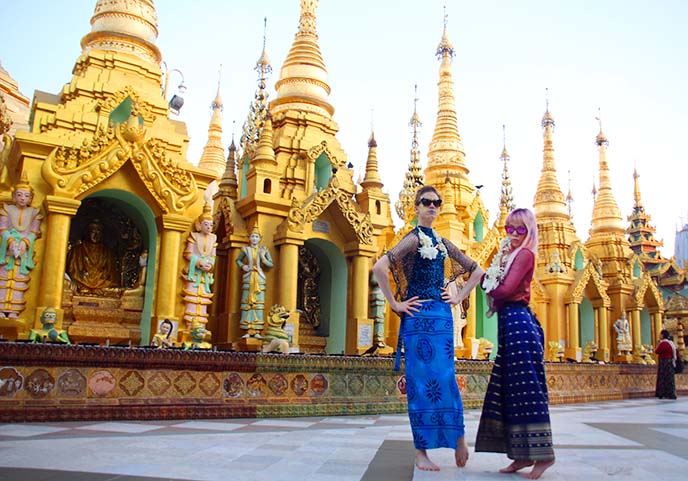
I’ve been to temples all over Southeast Asia, but none has been as extraordinary as Shwedagon Pagoda in Myanmar. In this photo diary, Yukiro and I will show you why!
Before we begin our pilgrimage, I’m humbled and thrilled to announce that I won the Best Blog of the Year award! A zillion thank yous to everyone who voted in the Auxiliary Magazine awards. None of this would have been possible without your support throughout the years. Congrats to the other winners and fabulous nominees, and I am excited to keep on bringing alternative travel stories to you in 2017.
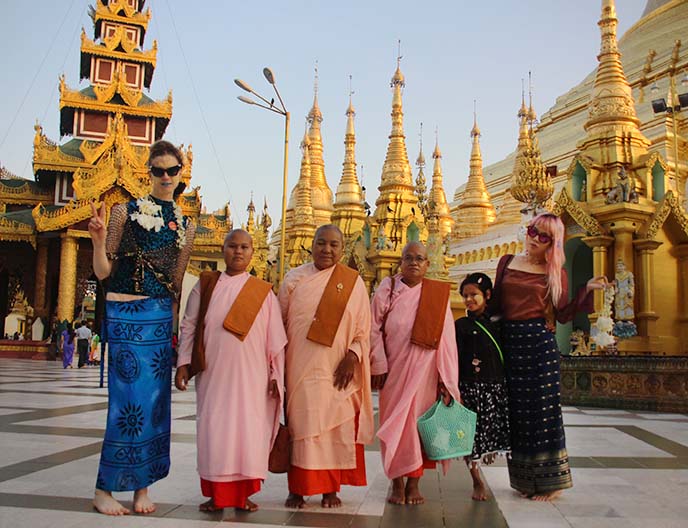
Yukiro and I are standing inside Shwedagon, with lovely locals. This huge golden Buddhist temple complex dominates the Yangon skyline, and is one of the most sacred sites in Myanmar (Burma). The name breaks down to “shwe” (gold in Burmese) and “Dagon” (the township where it is located).
That day, we met the kindest, gentlest Buddhist nuns, dressed in pink robes…
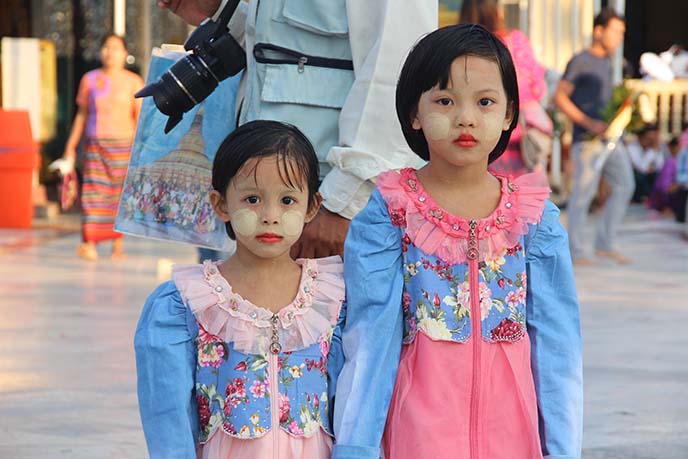
… and children with thanaka (sun-protecting face paint) on their cheeks. (All photography by Sniper Chau.)
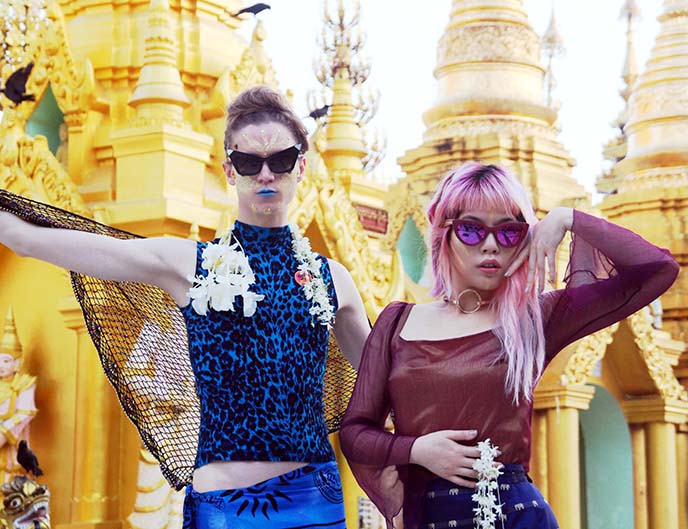
Let’s begin our visit to Shwedagon Pagoda with a note on the dress code. Out of respect to those who come to the temple to worship, all visitors (male and female) should wear clothes that cover their legs and shoulders. Shorts aren’t permitted, but there are longyi that you can borrow at the front if you forget.
Despite the clothing restrictions, you can still glam it up — as we did! We wore long wrap skirts (mine is from Thailand), and lightweight tops that kept us from overheating in the humid weather. (Yukiro had the shawl over his arms except for this moment of posing!) Sunglasses are a must, as the golden glare hits hard once the sun rises. In addition to sunscreen, we painted some thanaka over our skin as well.

We met our ParkRoyal Hotel Yangon driver in the lobby at 6am, as we wanted to catch the dawn. It’s worth waking up early, as sunrise and sunset are the best times to visti Shwedagon Pagoda. (You also avoid the crowds and the high noon-time heat this way).
The temple is open from 4am to 8pm, and the entrance fee for foreigners is $8 (about 8000 kyat — make sure you have the local Burmese currency). Everyone must remove his or her shoes at the entrance, and go barefoot inside the complex. If you’re a foreigner, there’s a special rack where you can store your shoes (otherwise, you’d have to carry them with you).
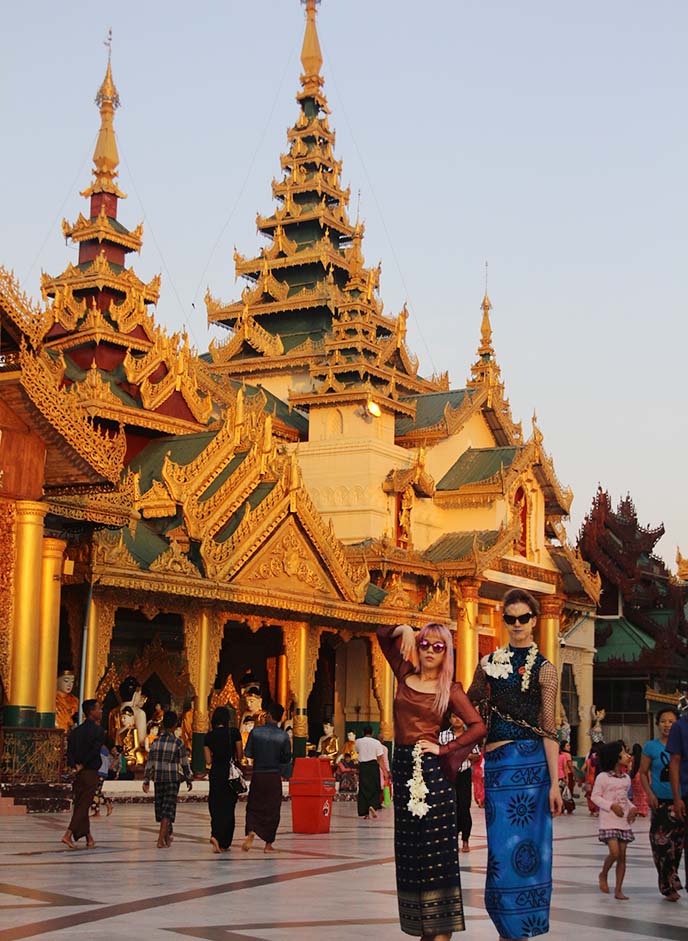
We walked down the long corridor, and bought a fragrant strand of white flowers. It opened up into this mesmerising plaza filled with gilded architecture and colorful Buddhist statues — we felt as if we’d entered a new universe.
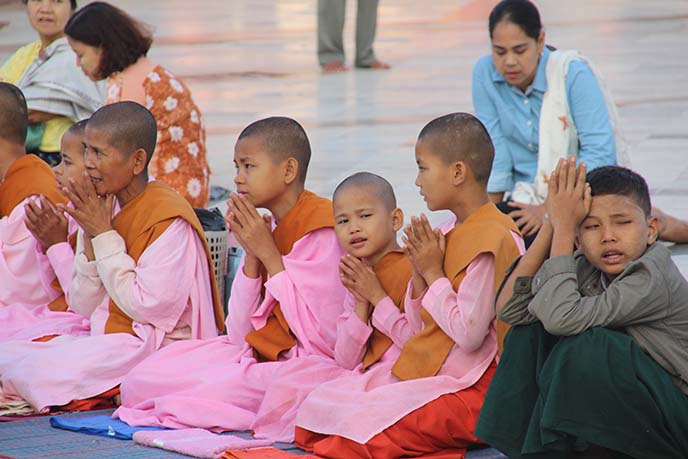
Shwedagon is a feast for the eyes and senses. It’s filled with an energy of compassion and happiness — as personified by these praying, chanting Buddhist children.
The pagoda sits on Singuttara Hill, and holds the relics of four Buddhas. The first version was most likely built by the Mon people between theb Shwedagon Pagoda was pillaged many times, rebuilt and expanded, and struck by earthquakes — but has stood strong, and is grander than ever.
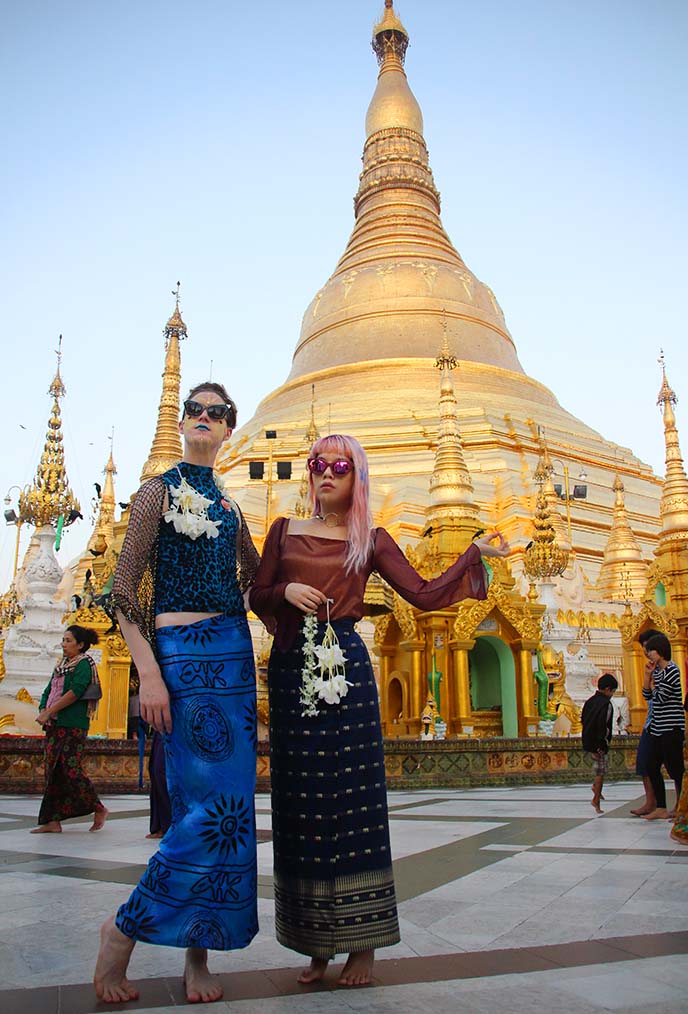
Could there be a destination more fabulous than this one?
Shwedagon is the largest stupa in the country, at 99 meter high. It’s plated with over 20,000 gold bars, with a tip decorated with thousands of diamonds, rubies and sapphires. The various buildings hold treasures of Burmese art, including the Tharrawaddy Min Bell that weighs 44 tons.
(In the 17th century, a Portuguese adventurer stole the 300-ton Great Bell of Dhammazedi — but it fell into the Bago River and was never recovered.)
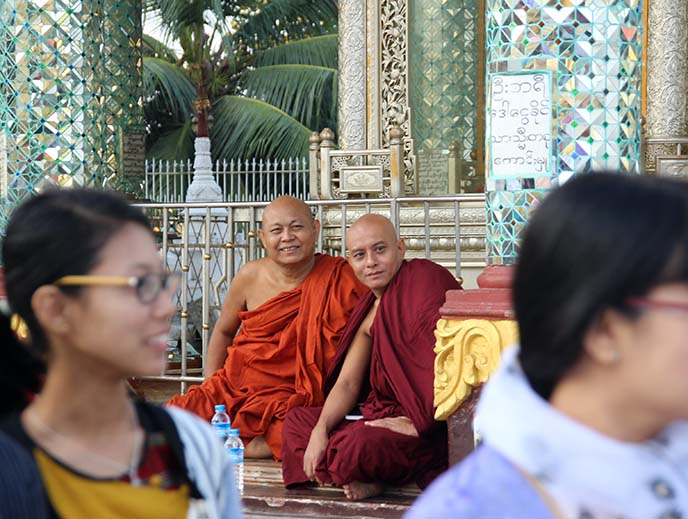
Myanmar is the world’s most Buddhist country, with most locals identifying as Theravada Buddhists. It’s a regular sight to see monks and nuns of all ages in the city, and we encountered many smiling faces here.
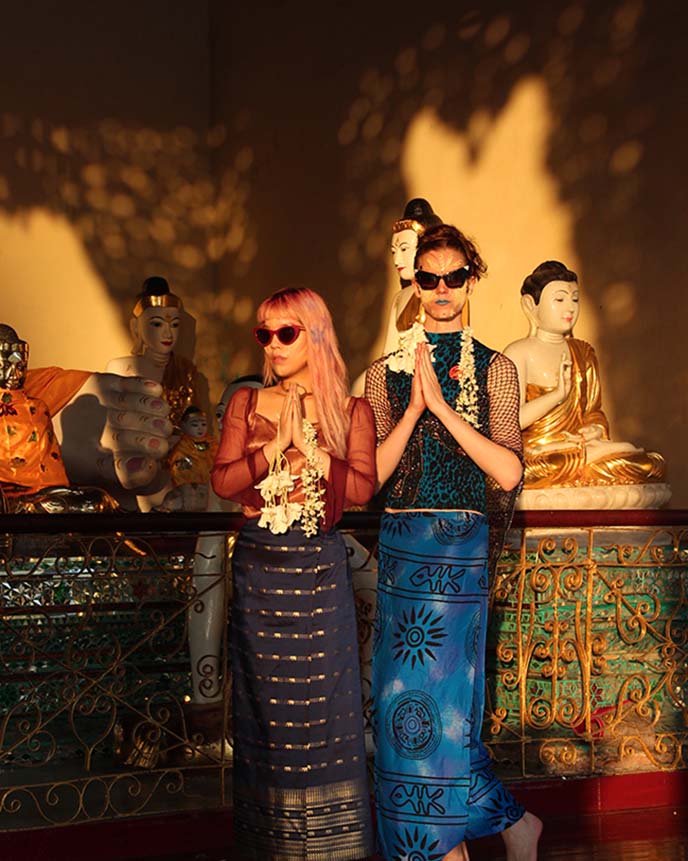
I think Yukiro and I fit in rather well with the decadent, golden art!
Visitors can spend hours wandering into the various buildings, where there are thousands of Buddha statues and relics to behold.
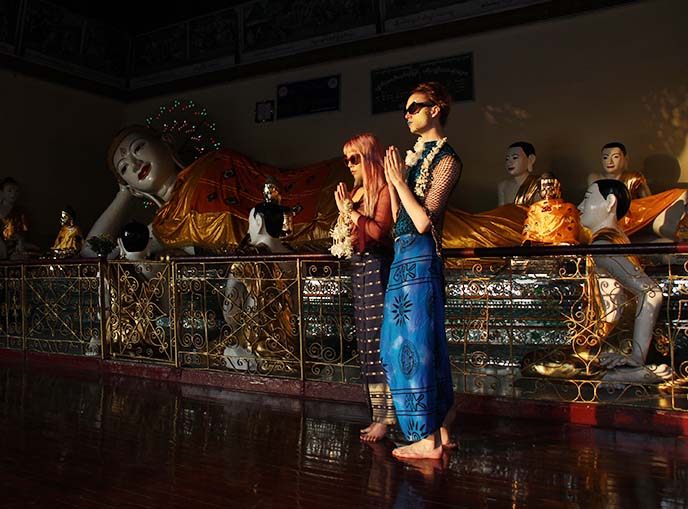
Although Shwedagon Pagoda is centuries-old, and has traditional architecture, you’ll also see modern incarnations. Such as this reclining Buddha with a flashing, electric cyber-disco halo around his head.
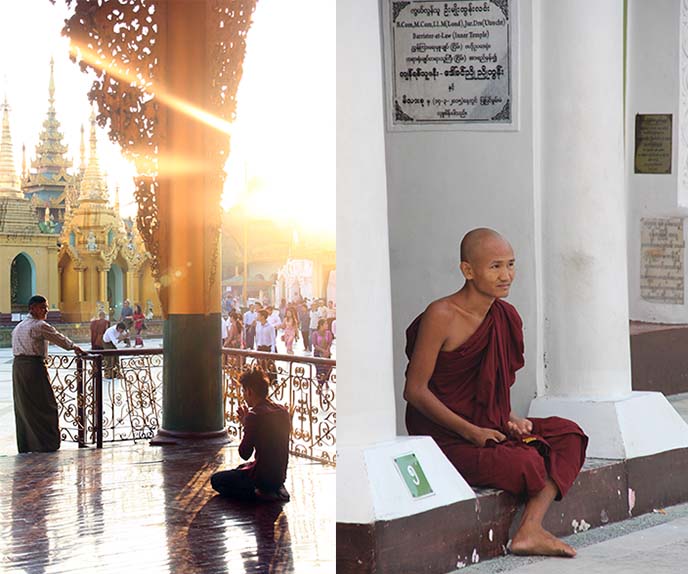
The spirituality is open and welcoming in Myanmar. We saw punk rockers praying, and monks with tattoos. Some locals choose to become monks or nuns for a short period of time (such as few weeks or months).
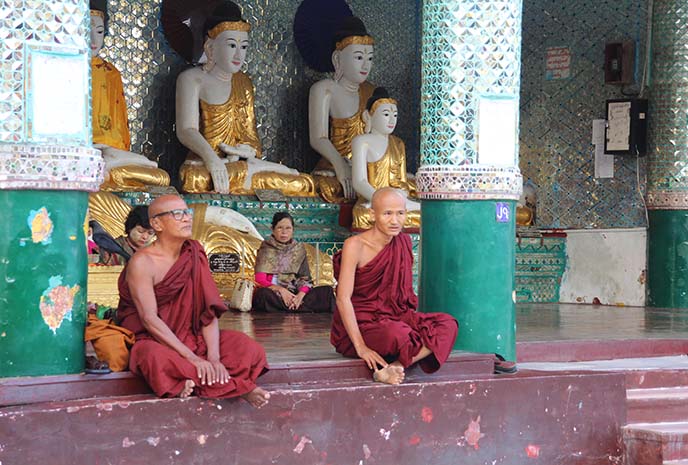
I wasn’t too familiar with Burmese sculpture / art until I visited, and was in awe. In this tradition, Buddhas are smiling and friendly, and draped in golden robes.
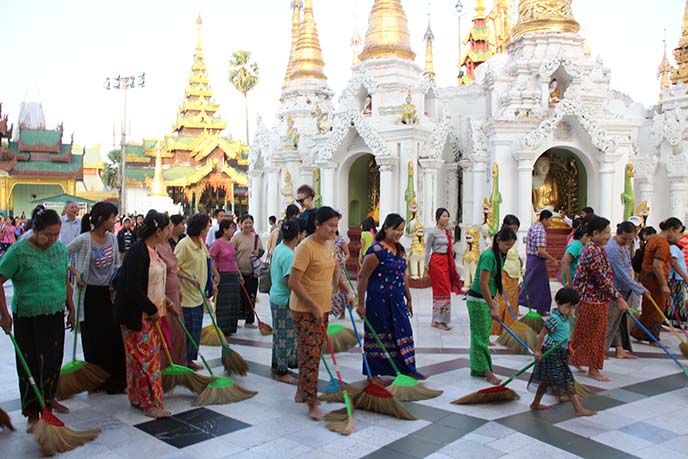
We had no issues walking around barefoot, as the tiles are kept clean by volunteers with mops. Locals have always pitched in to preserve Shwedagon, taking part in activities such as sweeping the floor, washing the statues, and repairing damaged areas.
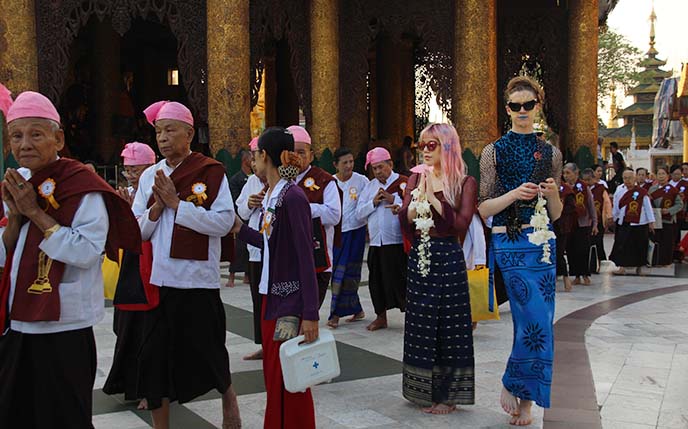
The stupa is a top Buddhist tourism destination. We saw a tour group of men and women in pink headwraps, travelling together on a spiritual pilgrimage.
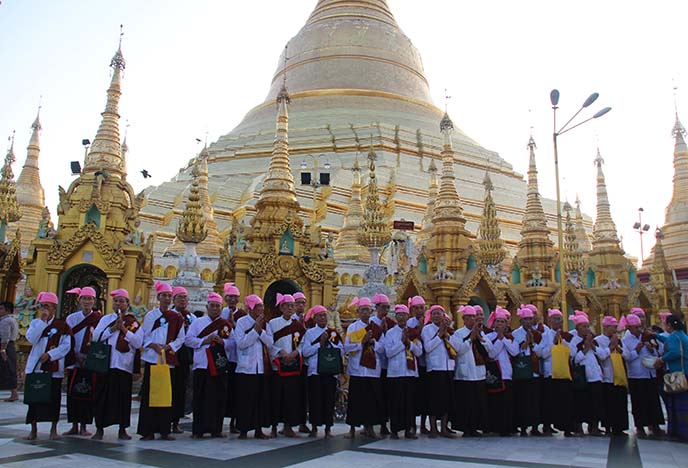
I loved seeing the joy and tranquillity on everyone’s faces.
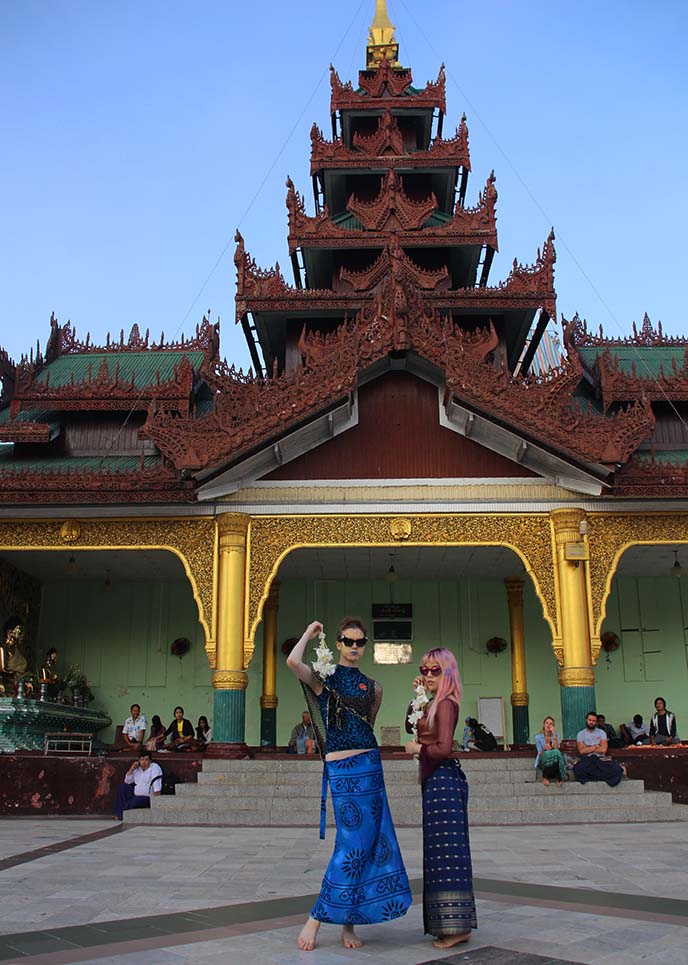
Burmese architecture ranges in styles. This reddish-brown spiky roof spoke to our Gothic aesthetics.
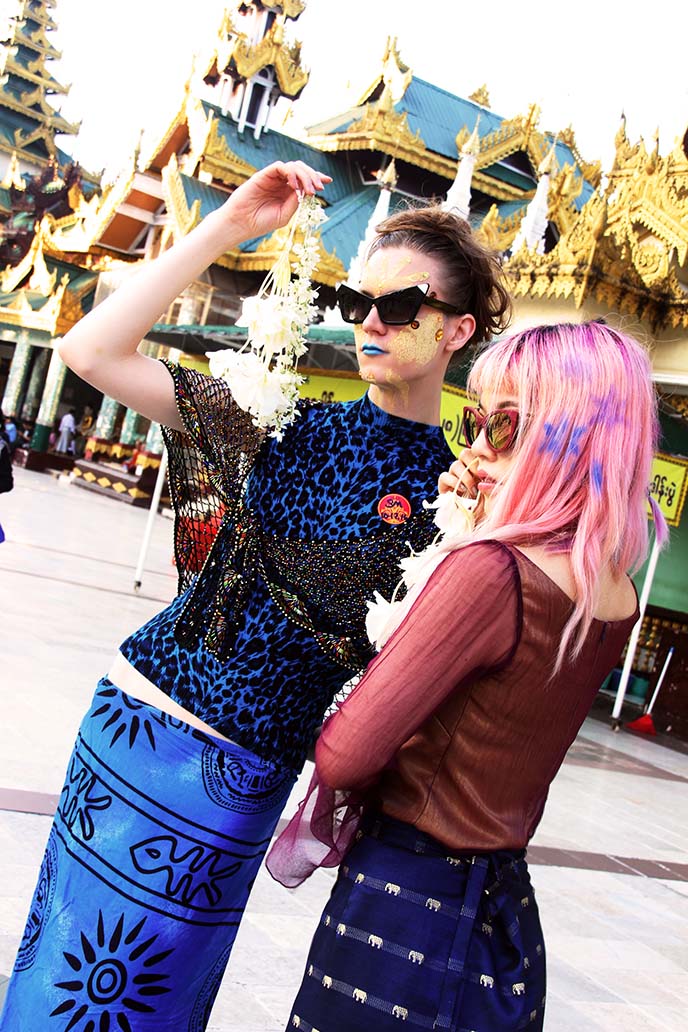
As the sun continues to rise, the tiles heat up. It’s good to go early (as we did) so that you can leave before high noon.
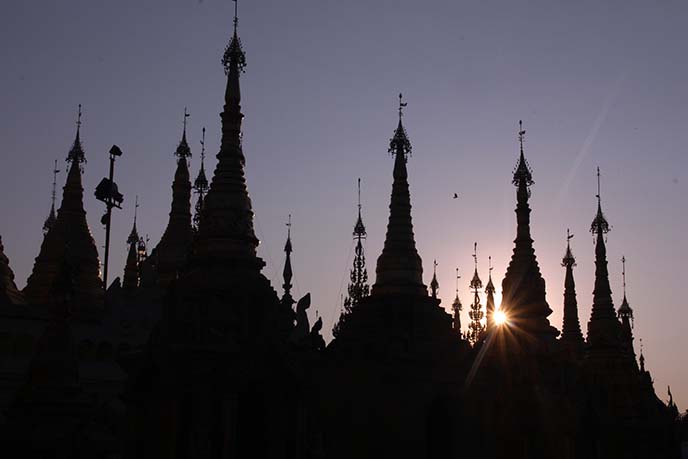
As author Rudyard Kipling described it: “Then a golden mystery upheaved itself on the horizon, a beautiful winking wonder that blazed in the sun.”
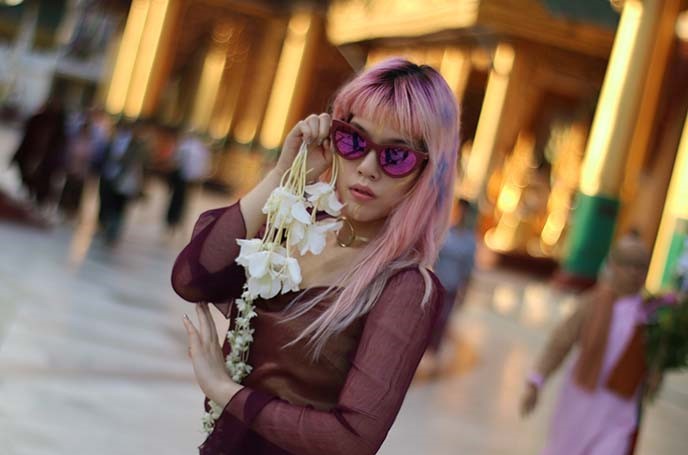
Wearing cat-eye sunglasses by Moat House Eyewear, which match my pink hair and top.

A lot of locals came up to us, and gently asked to take photos together. We got nothing but compliments on our outfits and style.
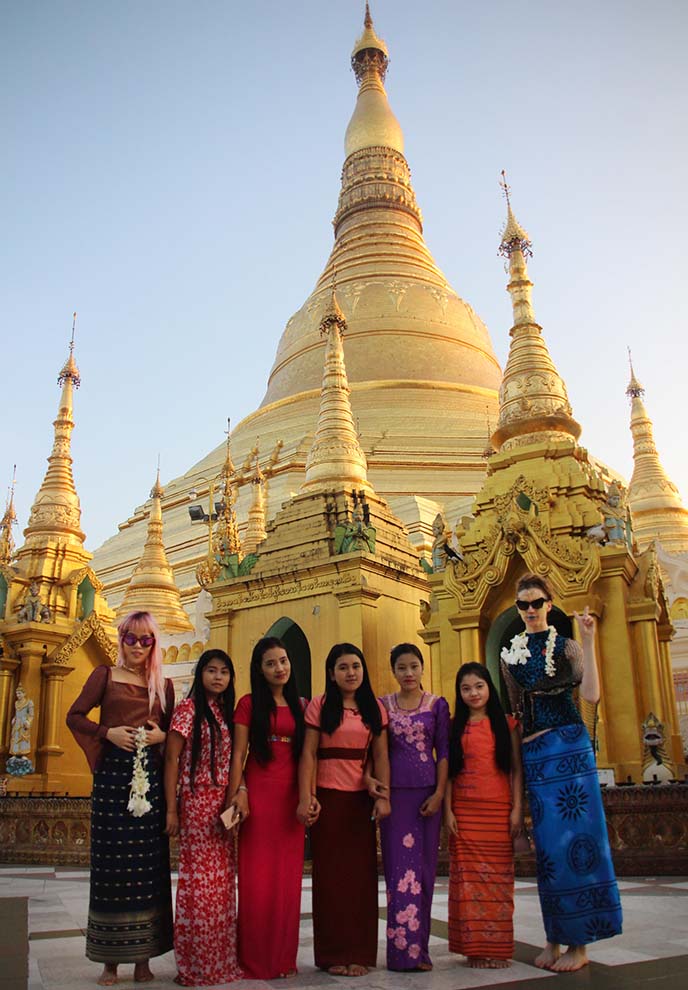
We became fans of the elegant, traditional fashion — particularly these Burmese long skirts, or longyi. This group of women shows it’s possible to be chic while following the dress code.
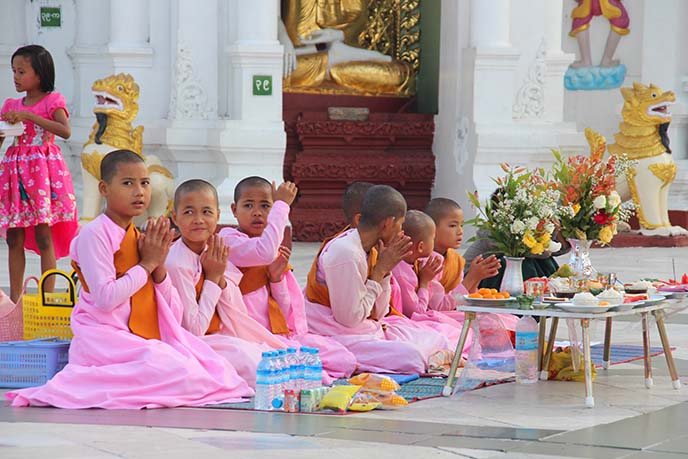
Offerings of fruit and flowers for the Buddha, made by these young devotees.

Loved seeing the small moments of generosity all around Shwedagon Pagoda.
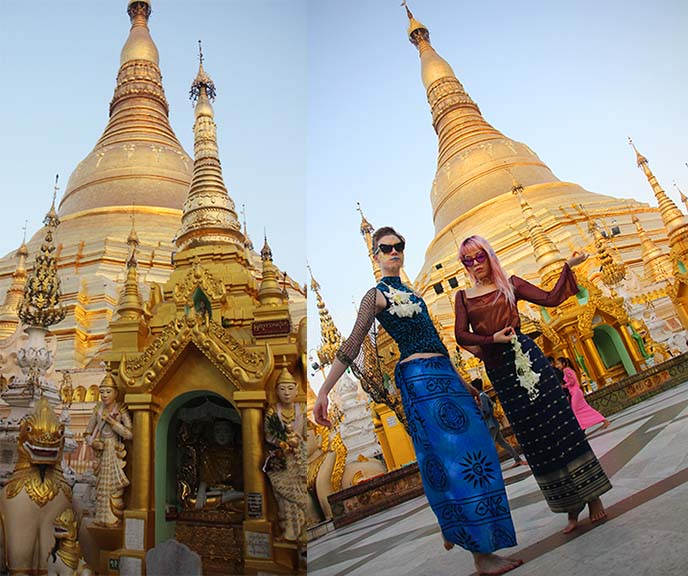
Myanmar has only recently opened to tourists, which means landmarks like these are still very locals-only. We saw only about 10 foreigners during this visit, and there weren’t any gift shops or touts.
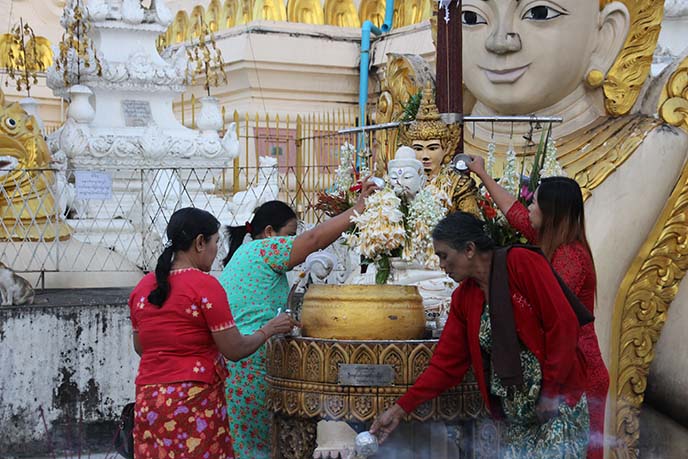
Many Burmese also follow traditions that come from Hindu astrology. They pour water and perform purifications at their “planetary post,” which refers to the day of the week they are born on. For example, if you were born on “Wednesday Morning,” you would look for a basin with this signpost, and make offerings and wishes there.
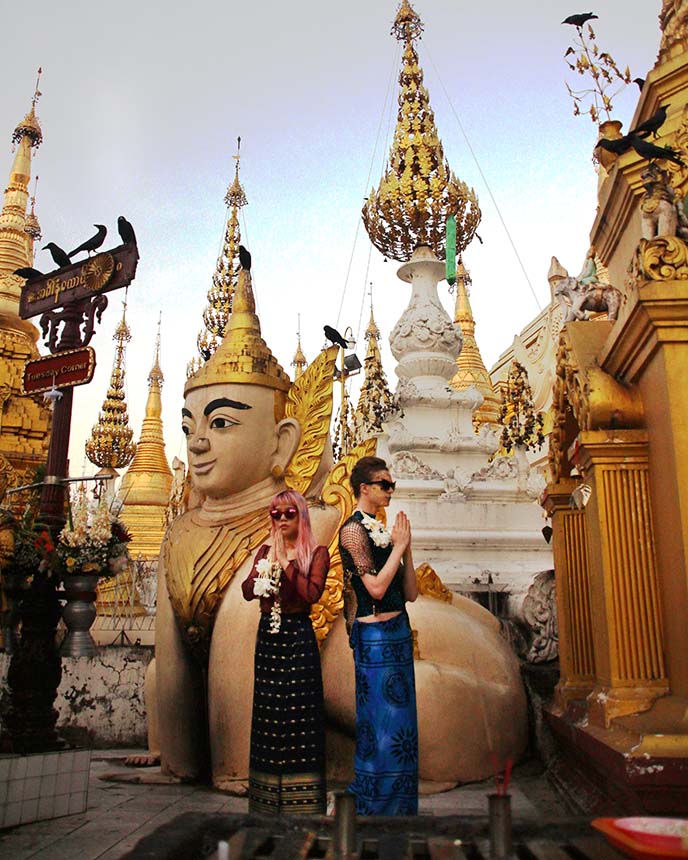
On the left, you can see the sign for “Tuesday Corner.”
We didn’t know which day of the week our birthdays fell on… but the giant leogryph (mythical lion creature) looked like our spirit animal.
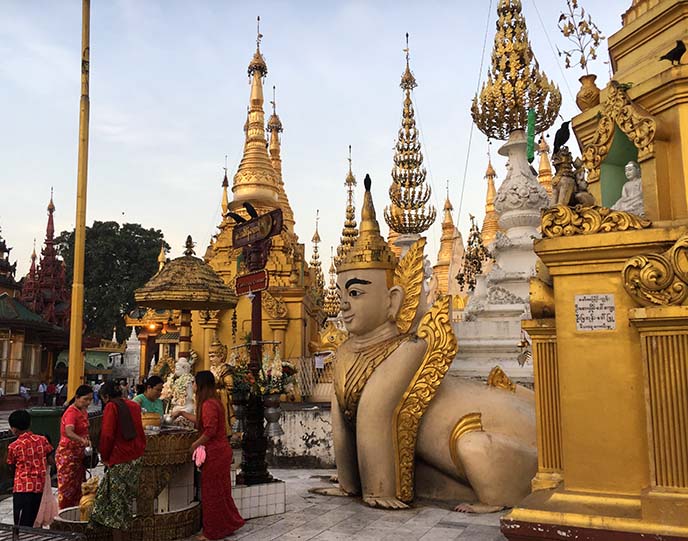
This protector lion being is a “chinthe”, often found at the entrances of pagodas and temples in Burma, Cambodia and Laos. Love the sideways-facing paws.

Snakes are another guardian, depicted with vampire-like fangs. The precise carvings found all over Shwedagon are impressive.
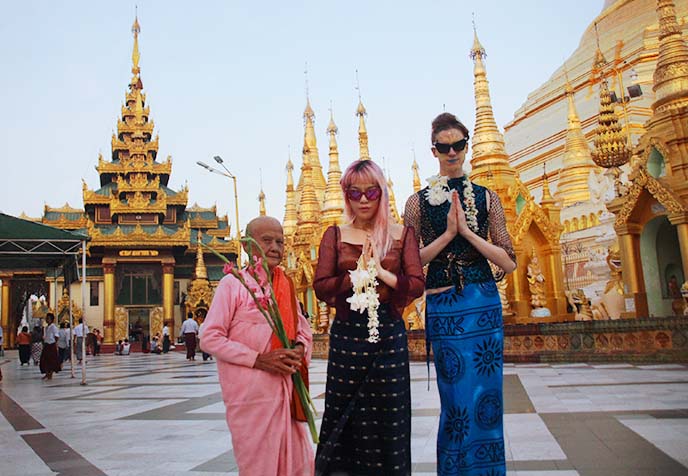
Photography is allowed in Shwedagon Pagoda. Anyone can respectfully ask monks or nuns if they’re willing to take a photo. However, as our guidebook counselled, one must not touch their robes (not even for a friendly pose).
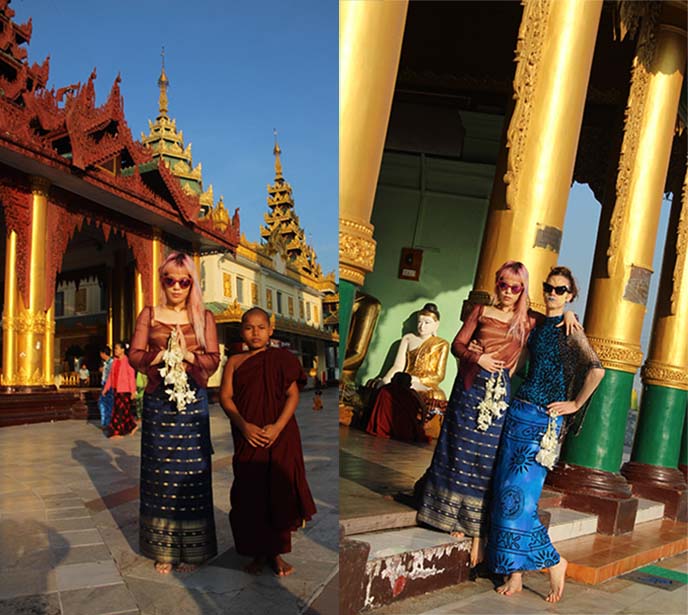
As you can see — it’s ok to stand next to a monk after getting his consent to take a photo together. But langorous arm-draping is a no-no!

Burmese children grow up learning the founding legend of this stupa. Once upon a time, two brothers were traveling when they met the Buddha beneath a tree. They offered him food, and as a thanks, the Buddha gave them eight hairs from his head!
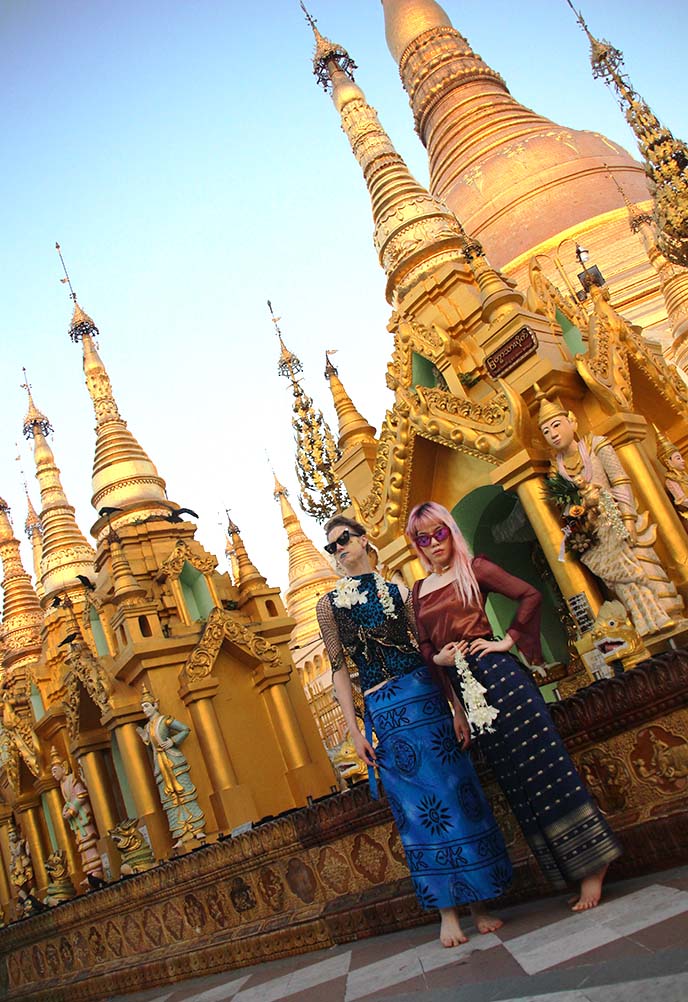
The brothers put the 8 hairs in a ruby casket and carried them back to Burma, where they started to build Shwedagon Pagoda with the help of their king.
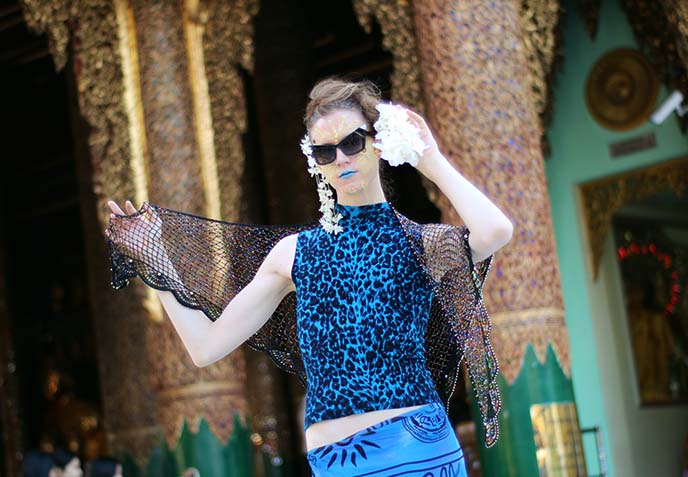
There are other relics preserved in the temple complex, ranging from sacred robes to… an ancient water filter.

This sign illustrates the story of the Buddha’s journey to enlightenment. Love the rainbow colors, and the gorgeous Burmese script.

It’s apparent how much meaning the Buddhist teachings have to locals here, through each stage of their lives.
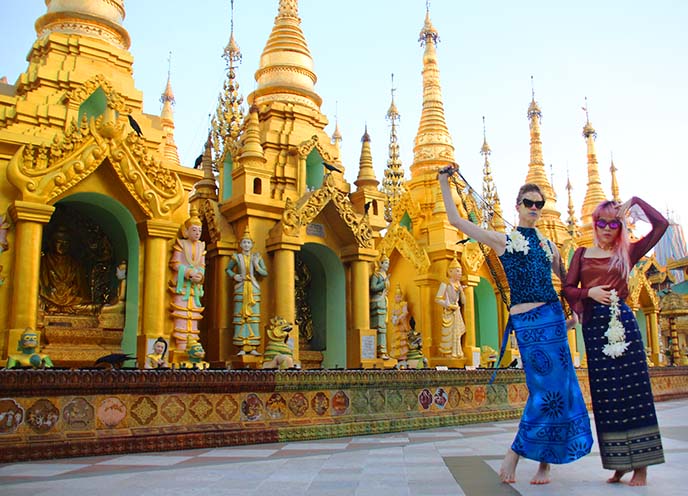
We’re very glad we got to spend time in Myanmar, a travel destination that people often overlook.

Such an interesting contrast between monastic simplicity, and golden richness.
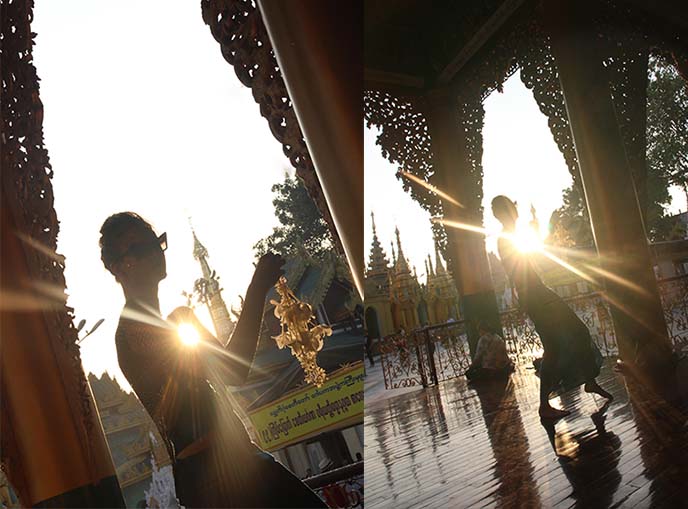
When we saw these flares of light, we knew why “Shwedagon Zedi Daw” is also know as the Golden Pagoda.

Don’t forget to walk around the edges of the complex, which tend to be quieter, and filled with surprses. Such as: a bodhi tree.

Siddartha Gautama meditated under a bodhi tree until he attained nirvana. Perhaps this monk, crouched under the canopy, will follow his path.

We encountered this lion guardian on the outskirts as well. The pale pink claws are on point.

Shwedagon is heaven for people-watching and photography. (All images by Sniper Chau.)

The women we met were stylish and self-possessed. The Burmese are known for their welcoming nature, perhaps testament to the Buddhist culture.

This nun smiled at us as we passed by, and her group of children followed suit. Moments like this remind me of why I travel.

I hope this photo diary conveyed the magic of Yangon’s Great Dagon stupa. Although the pagoda is not a household name, it now ranks among my favorite wonders of the world (and I’ve been to Petra, Angkor Wat, Hagia Sophia and more).

Coming up: we’ll show you more of Yangon, including Sule Pagoda and art galleries. A big thank you to ParkRoyal Hotel for the driver and travel tips. (See our review of ParkRoyal Myanmar here.)
Have you heard of Shwedagon before? Isn’t this spiritual site inspiring? Thank you again to everyone who voted for me in the Best Blogger of the Year awards — none of these adventures would be possible without your love!
SHARE & COMMENT
Guide to Visiting Angkor Wat: travel video! Siem Reap tour, Lara Croft temple & Buddha statues.

I’ve long been fascinated by the mysterious temples of Angkor Wat. It was a dream come true to live out my “Tomb Raider” fantasies in Siem Reap.
If this UNESCO site is on your bucket list, then I hope you’ll enjoy my latest Cambodia travel video (watch here), which includes tips on what to see and do.
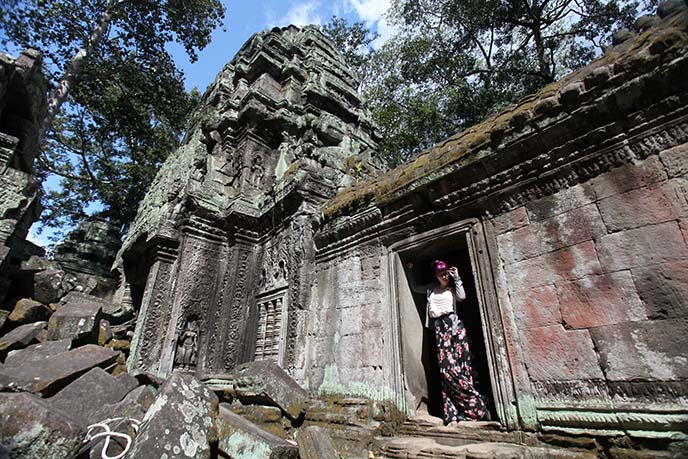
I’ll also share the dramatic photos we took amidst the ancient temple ruins — inspired by Lara Croft!
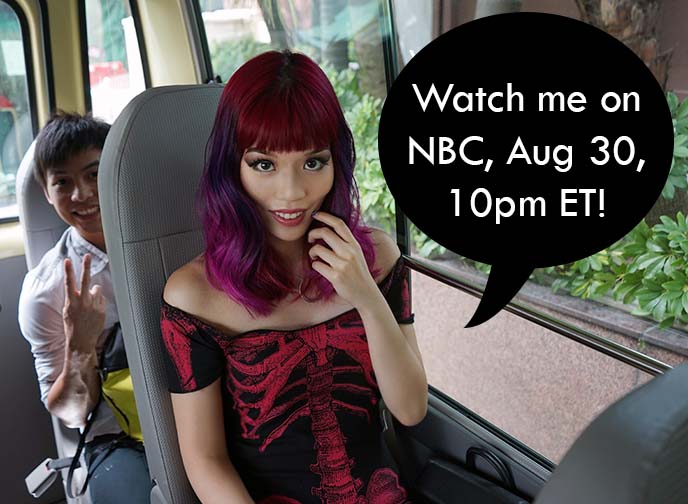
But first, a special announcement. I’m excited to finally reveal that I’m in a new NBC travel TV show, “Better Late than Never” — starring William Shatner (Captain Kirk) and Henry Winkler (The Fonz!) I shot this series last year in Asia, and had to keep it secret until now.
You can see me goofing off in Hong Kong on this major network program, which airs on Tuesday, August 30th at 10pm ET. (Check your listings to make sure of the exact air time, and stay tuned to my social media for previews.)
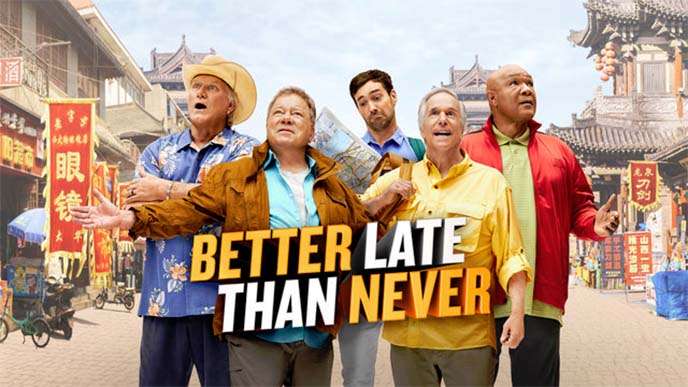
“Better Late than Never” is basically four elder celebrities on a bucket list adventure all throughout Asia. That’s correct: I got to be on-screen with William Shatner (Star Trek), Henry Winkler (Happy Days), boxer George Foreman, and football legend Terry Bradshaw!
Can you imagine how much fun I had with these legends? There was dancing, singing and costumes involved… Be sure to tune in this Tues, Aug 30 for a good laugh at our Hong Kong shenanigans!
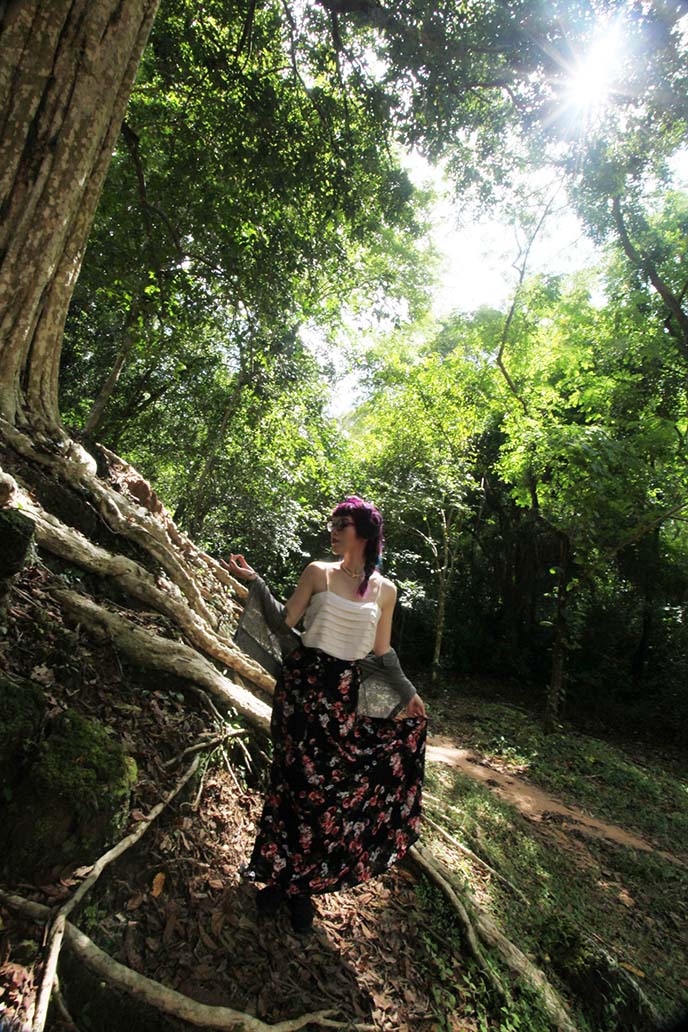
Outfit Details:
1990s dark floral skirt: from Pylo. Here is a similar shorter version of this skirt.
My glasses are by Oliver Goldsmith, whose styles are inspired by Audrey Hepburn, Grace Kelly and other silver screen icons.
Please take a moment to watch our short Cambodia travel video (above and on @lacarmina YouTube). It highlights some of the best travel attractions in Siem Reap, from the circus to the temples.
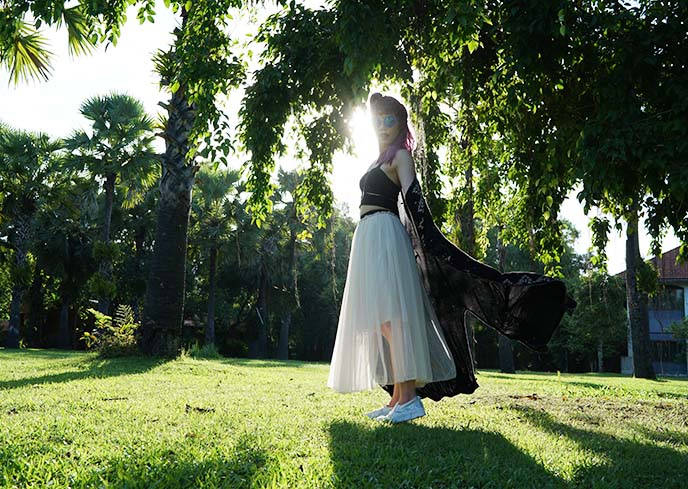
What’s the best hotel in Siem Reap? My vote goes to the magnificent Le Méridien Angkor hotel. They have a lush backyard garden…

… and modern interiors, inspired by classic Khmer design. The location is also as good as it gets: Angkor Wat is less than a 10 minute drive away.

Le Meridien has one of the coolest swimming pool designs I’ve seen. The waters are framed by gardens dotted with Hindu statues.

In my happy place. Wearing a Michi cut out top, and blue Linda Farrow sunglasses.

Lotus flowers add to the feeling of peace.

Posing with my travel buddy John Skeleton. We also went to Vietnam together, one of my favorite trips.

See many more photos of my outfit and Le Meridien Angkor, in this previous post.

Thanks to Ken Yuen and Sniper Chau for the photography.
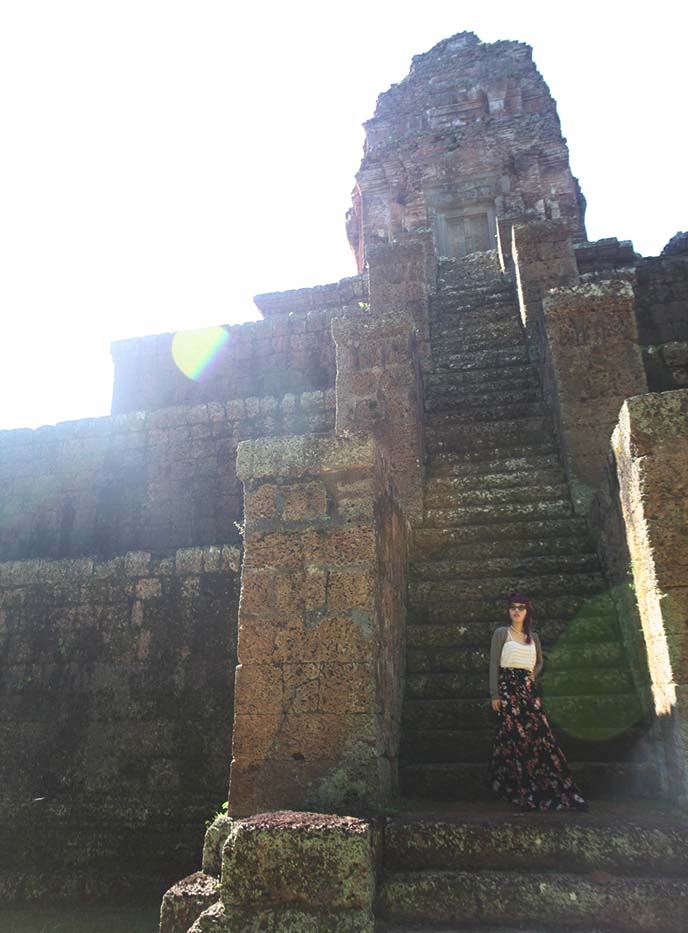
Now, let’s tackle the temples!
I recommend going to Angkor Wat at 5pm the day before your visit, to purchase your ticket (for one, three or seven days entry).

This way, you can go inside to see the sunset and skip the line-up the next day.

Our Le Meridien guide took us to a prime photo-taking position by the second reflective pool.
I am not a morning person, but it was worth waking up at 5am to see the sunrise over the towers of Angkor Wat.
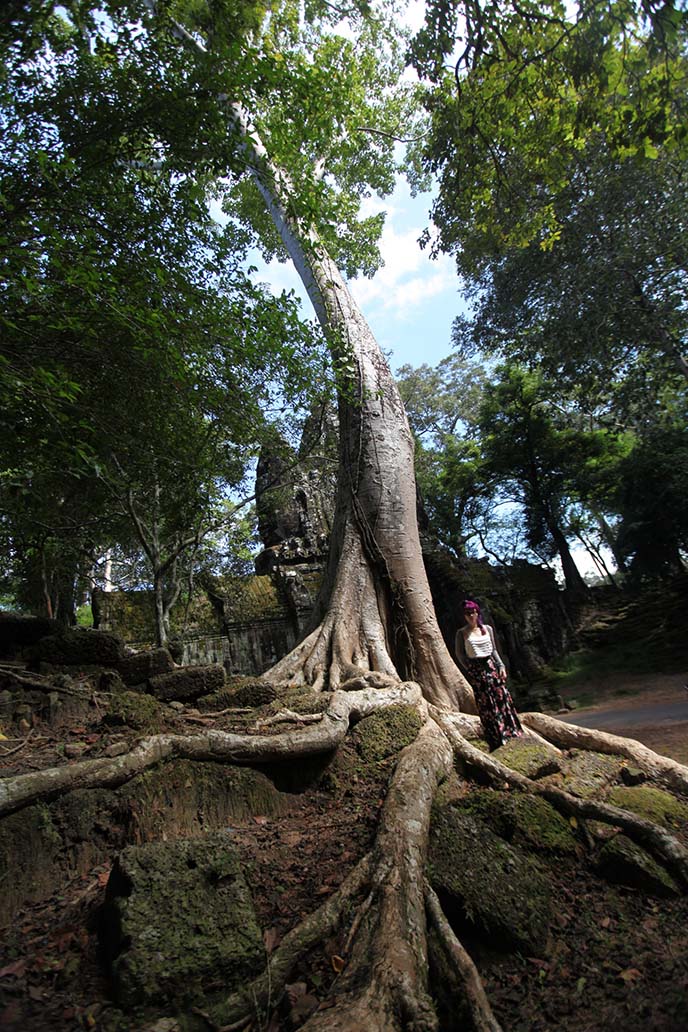
After dawn breaks, many tourists go on to explore the main buildings of Angkor Wat. However, to avoid the crowd, I suggest seeing other temples in the morning (there are over a thousand in this large complex).
Walking through the humid jungle can be a challenge, but you’ll get to see powerful trees with roots like this.
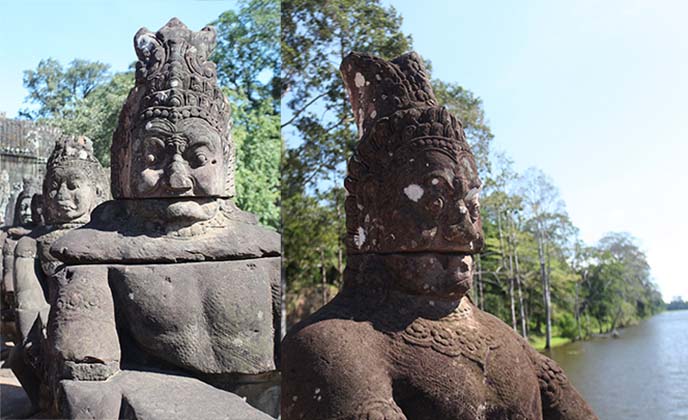
Some tourists ride tuk-tuks or bikes, but my team and I had a driver and guide, which made it easier to get around.
The left side of this pathway over the water had Buddha statues. We preferred to take photos of the right side, which was lined with scowling demons.
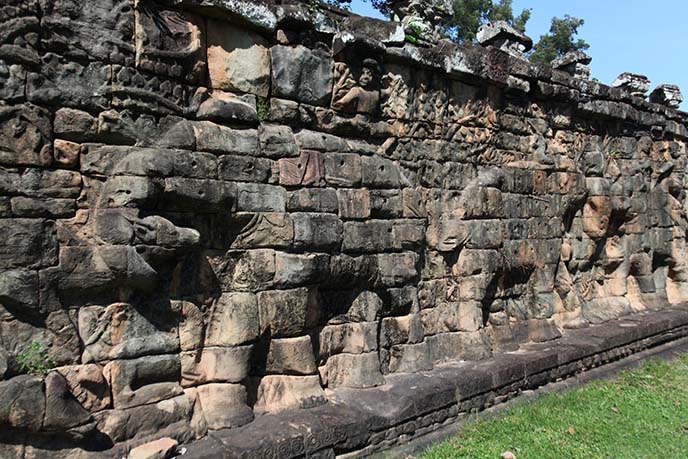
Our guide showed us the Terrace of the Elephants. It was the site of public ceremonies for the Khmer king and his troops.
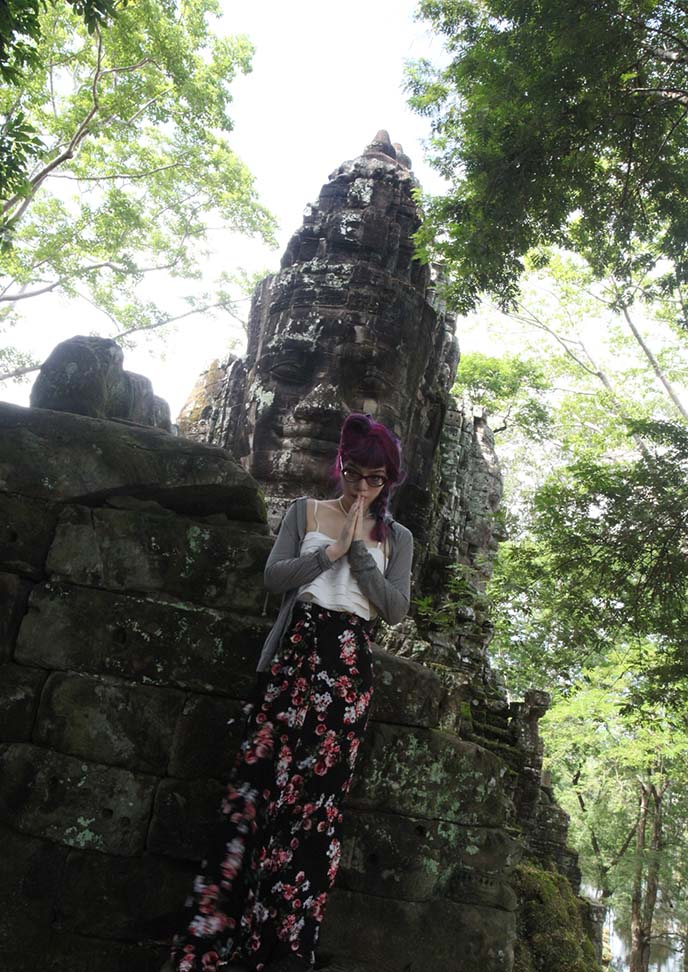
One can’t help but smile when you come across these beaming Buddha faces, peeping out from the trees.
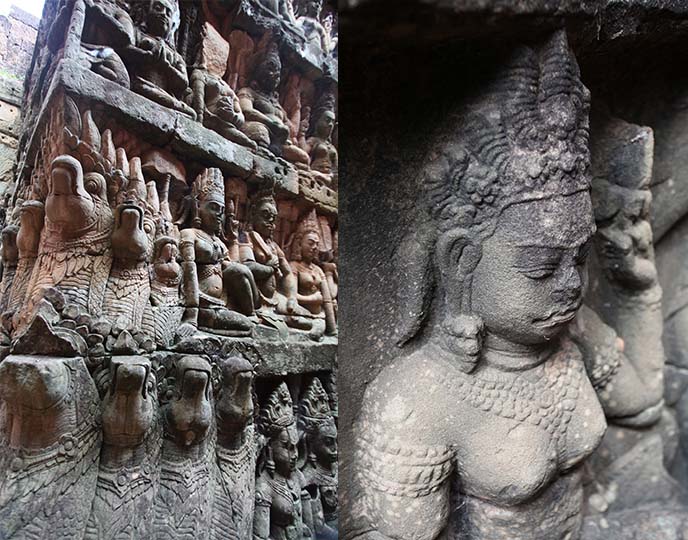
I was mesmerized by this long wall of carvings, which depict Hindu devas.
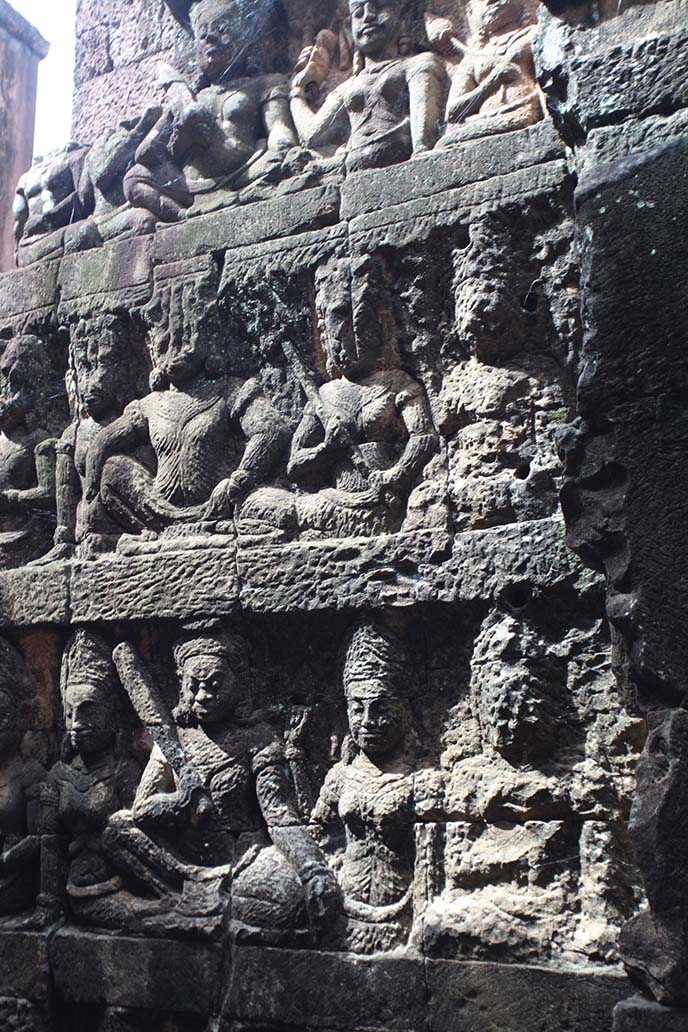
Some of the faces have been worn down by the elements and time, adding to the feeling of mystery.
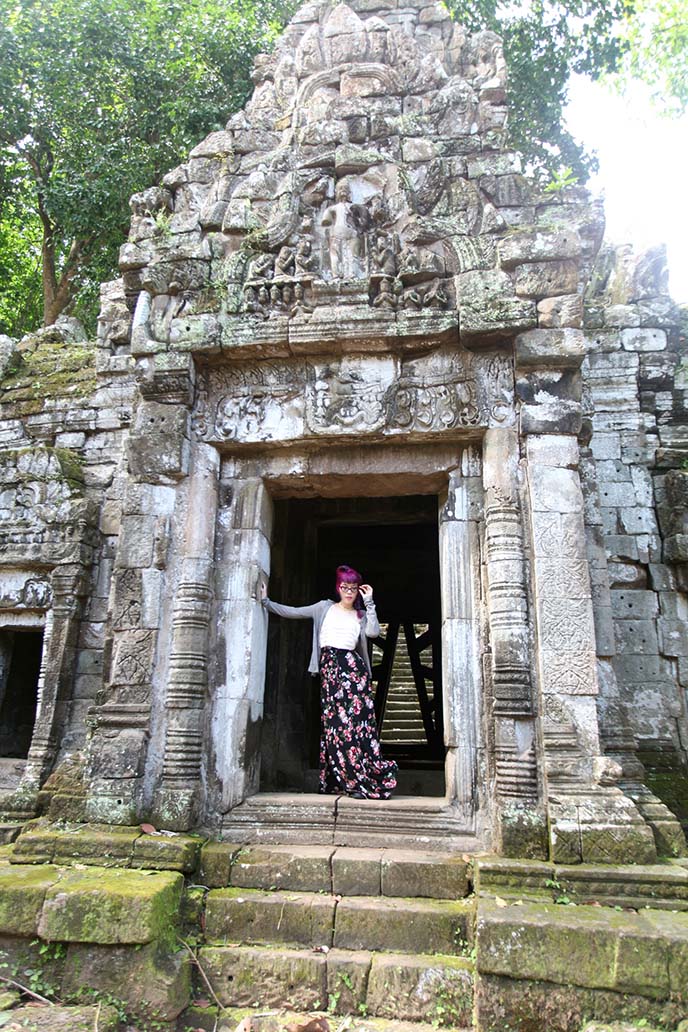
Words can’t capture the feeling of standing right in the doorway of century-old ruins. The Cambodian architecture stands the test of time.
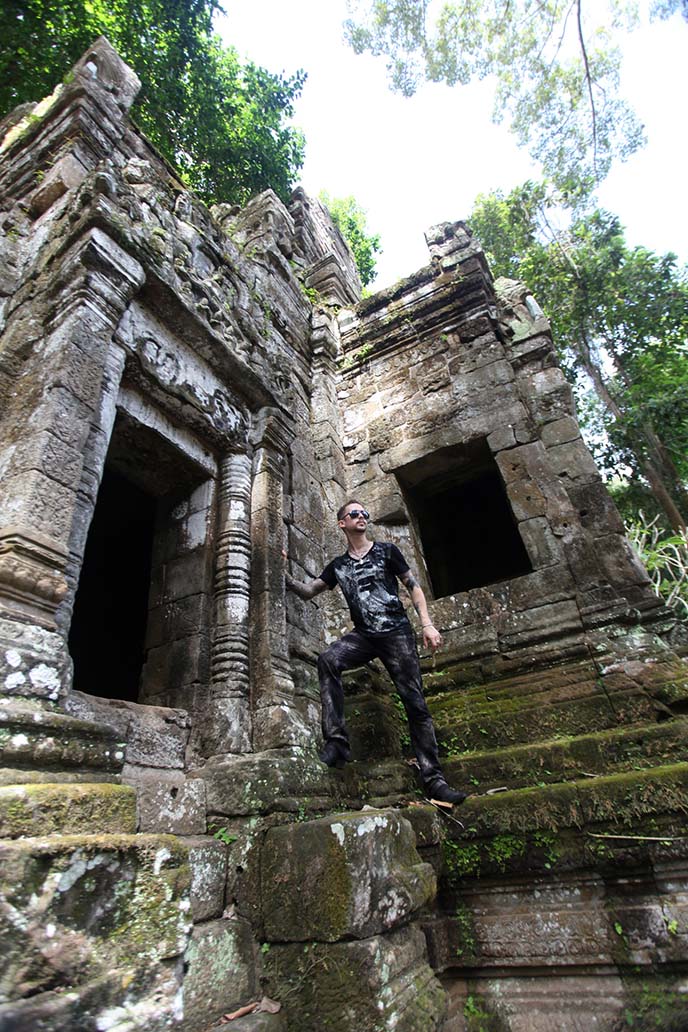
Anyone can get up close to the structures, and even climb them. Just watch out for the slippery moss.
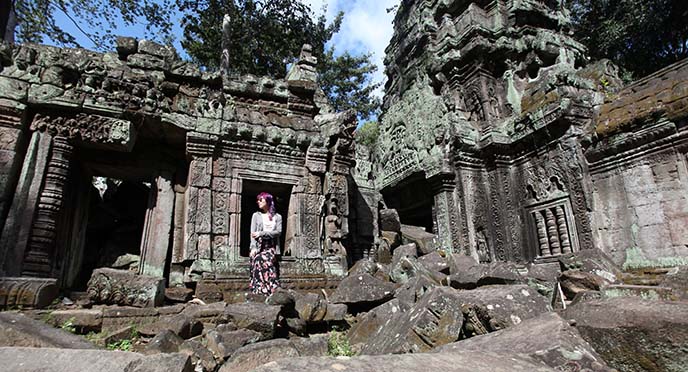
Feeling like I’ve entered a lost world. There were no other tourists around us, since our guide helped us avoid the crowds.
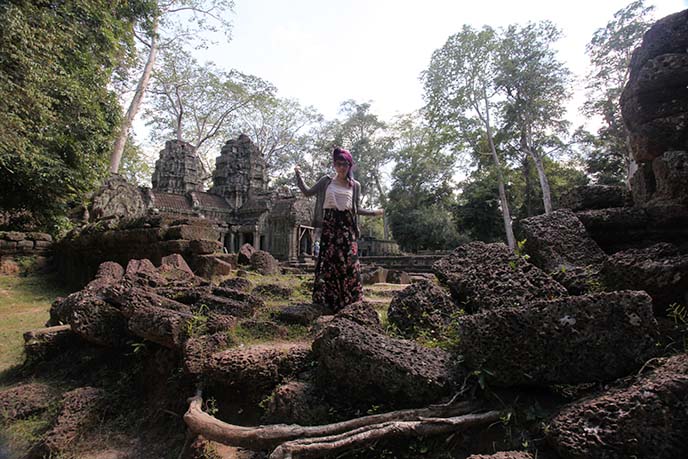
Imagining that I am Lara Croft for a day. I even wore a braid in my hair.
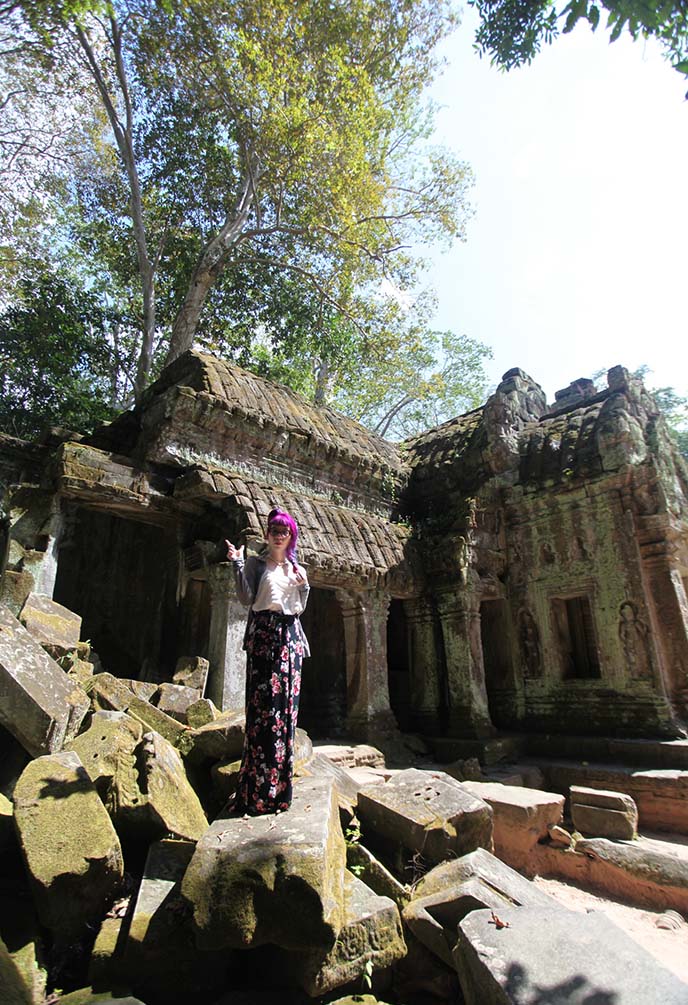
The fallen bricks are as beautiful as the standing structures, in their own way.
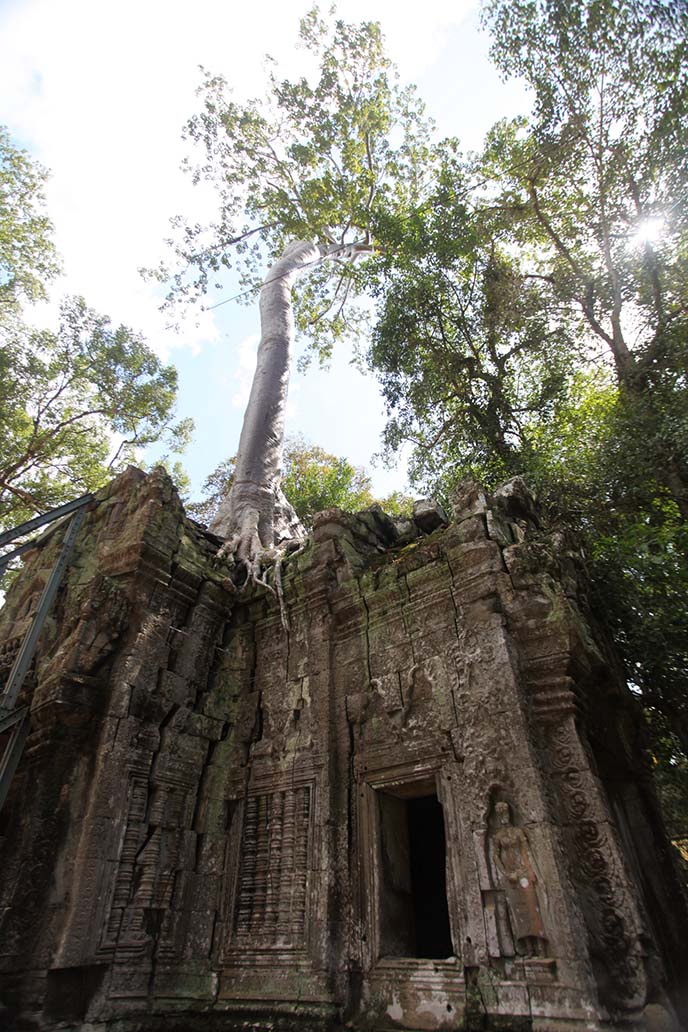
If you only have one day, be sure to visit Bayon with its smiling Buddha faces. You also can’t miss Ta Prohm, the “Tomb Raider” temple with tree roots converging into the ancient architecture.
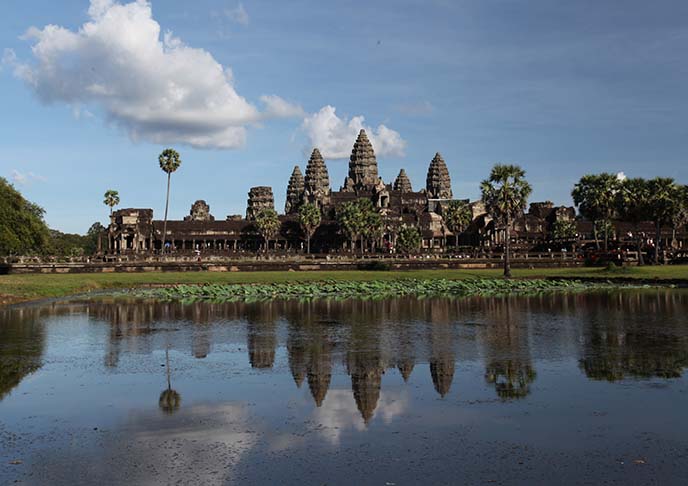
In the afternoon, I suggest returning to the main Angkor Wat temple. The lighting conditions are best at this time, letting you capture dramatic light and shadows.

A big thank you to HK Express for making this epic journey possible. This short-haul airline goes directly from Hong Kong to Siem Reap, and the service is phenomenal. They fly to Tokyo, Osaka, Seoul and other destinations in Asia as well.

In addition to the temples, you can experience a wide range of nightlife, restaurants and entertainment in the city center. Be sure to check out my Siem Reap travel guide for food and bar tips.

If these photos caught your attention, then come see my Angkor Wat Cambodia video (click to play). I hope you find my recommendations helpful.
And don’t forget to tune in on Tuesday, August 30th — NBC channel — to watch me on “Better Late Than Never” with Henry Winkler, William Shatner, Henry Foreman and Terry Bradshaw! Life can be full of amazement, wouldn’t you agree?
 LA CARMINA
LA CARMINA






